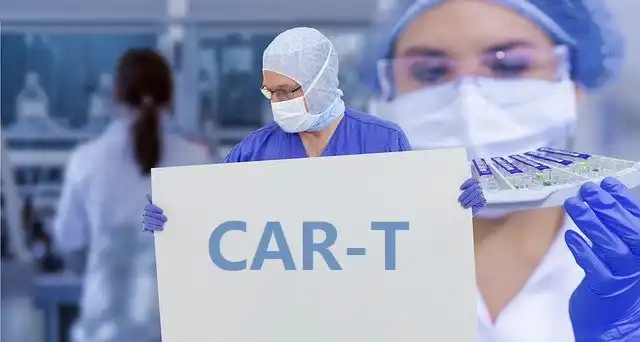Yescarta for relapsed/refractory large cell lymphoma is significantly better
- Normal Liver Cells Found to Promote Cancer Metastasis to the Liver
- Nearly 80% Complete Remission: Breakthrough in ADC Anti-Tumor Treatment
- Vaccination Against Common Diseases May Prevent Dementia!
- New Alzheimer’s Disease (AD) Diagnosis and Staging Criteria
- Breakthrough in Alzheimer’s Disease: New Nasal Spray Halts Cognitive Decline by Targeting Toxic Protein
- Can the Tap Water at the Paris Olympics be Drunk Directly?
- Should China be held legally responsible for the US’s $18 trillion COVID losses?
- CT Radiation Exposure Linked to Blood Cancer in Children and Adolescents
- Can people with high blood pressure eat peanuts?
- What is the difference between dopamine and dobutamine?
- What is the difference between Atorvastatin and Rosuvastatin?
- How long can the patient live after heart stent surgery?
CD19 CAR-T cell therapy: Yescarta for relapsed/refractory large cell lymphoma is significantly better
Yescarta for relapsed/refractory large cell lymphoma is significantly better. Yescarta’s second-line treatment for relapsed/refractory large cell lymphoma (LBCL) is significantly better than standard care!
Kite Pharma, a cell therapy company under Gilead, recently announced the top-line results of the CD19 CAR-T cell therapy Yescarta (Axicabtagene Ciloleucel, Axi-Cel) milestone ZUMA-7 study. This is a randomized, open-label, global, multi-center phase 3 study, carried out in adult patients with second-line relapsed or refractory large B-cell lymphoma (2nd-line R/R LBCL). Yescarta (one-time infusion) Note) Compared with the current standard care (SOC: chemotherapy + stem cell transplantation). The ZUMA-7 study was launched in 2017 and recruited 359 patients (age range: 22 to 81 years) in 77 centers around the world, 30% of whom were 65 years of age or older.

Because the cancer recurs or becomes ineffective to treatment options, approximately 40% of LBCL patients require second-line treatment. The standard care of second-line R/R LBCL is divided into two steps: re-introduction of immunochemotherapy, if the patient responds and can tolerate further treatment, continue with high-dose chemotherapy and stem cell transplantation.
The results announced this time represent the longest follow-up time for second-line R/R LBCL, with a median follow-up time of 2 years. The results showed that the study reached the primary endpoint of event-free survival (EFS): Yescarta showed superiority in the treatment of second-line R/R LBCL compared with SOC, improving EFS by 60% (HR=0.398, p<0.0001). In addition, the study also reached the key secondary endpoint of objective response rate (ORR). The interim analysis of overall survival (OS) shows a trend in favor of Yescarta, but the current data is not yet mature, and further analysis is planned in the future.
In this study, event-free survival (EFS) was defined as the time from randomization to disease progression, starting new lymphoma treatment, or death from any cause. The ZUMA-7 study was carried out under a special agreement (SPA) with the US FDA, according to which the trial design, clinical endpoints and statistical analysis were agreed with the FDA in advance.
The milestone ZUMA-7 study was launched in 2017 as the first randomized clinical trial to test whether the early use of CAR-T cell therapy is better than standard care (SOC). The results confirmed that in the second-line treatment of relapsed or refractory LBCL, Yescarta showed a highly statistically significant and clinically significant improvement compared with SOC.
The safety results of this study are consistent with or lower than the known safety of Yescarta’s third-line treatment of LBCL. 6% of patients had Grade 3 or higher cytokine release syndrome (CRS), with a median onset time of 3 days, and 21% of patients had Grade 3 or higher neurological events (NE). No new safety issues were found in the second-line treatment.
The detailed results of the ZUMA-7 study will be announced at a future medical conference. Kate Pharmaceuticals plans to discuss the submission of a supplementary application with the US FDA, EU EMA and other global regulatory agencies to expand the currently approved Yescarta indications. Currently, Yescarta has not been approved by any regulatory agency for the treatment of second-line R/R LBCL patients similar to the ZUMA-7 study.
Frederick L. Locke, the lead researcher of the ZUMA-7 study and co-leader of the immuno-oncology program at Moffett Cancer Center in Tampa, Florida, said: “The top-line results of the randomized ZUMA-7 study depict a potential paradigm shift in the treatment of LBCL. The study showed that in patients with LBCL who had relapsed or refractory disease after first-line chemotherapy, compared with long-term second-line standard care (chemotherapy and consolidation autotransplantation), patients who received a single infusion of Yescarta had a significantly improved prognosis. “
Christi Shaw, CEO of Kate Pharmaceuticals, said: “Yescarta has played an important role in changing the prognosis of third-line LBCL patients. Our goal is always to allow more patients to benefit from CAR-T cell therapy in the early stages of treatment. Patients at this stage may be more likely to benefit. As a leader in the field of cell therapy, Kite is honored to complete this landmark study and thanks patients, families, doctors and nursing teams around the world for making this success may.”
Yescarta (Axicabtagene Ciloleucel, Axi-Cel) is a CD19 CAR-T cell therapy, acquired by Gilead for USD 11.9 billion to acquire Kite. In the United States, Yescarta was approved by the FDA in October 2017 and is the first CAR-T cell therapy for adult patients with relapsed or refractory large B-cell lymphoma (R/R LBLC).
In March 2021, Yescarta was approved by the FDA for a new indication: for the treatment of relapsed or refractory (R/R) follicular lymphoma (FL) adults who have previously received 2 or more systemic therapies patient. According to this latest approval, Yescarta is the first CAR-T cell therapy approved for the treatment of FL.
(source:internet, reference only)
Disclaimer of medicaltrend.org
Important Note: The information provided is for informational purposes only and should not be considered as medical advice.



